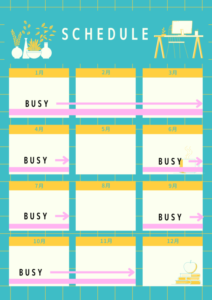Prepare for your Job interview in Japan
Why do I need to read this article?
Are you ready for a job interview with a company in Japan? Well, you’ve come to the right place! In this article, we will List up 33 must-read sample questions to help you ace your job interview in Japan!
Maybe you are wondering, why are there a whopping 33 questions? Yes, it is quite a long list skim through. However, by reading all of this list, you will actually save time because you do not have to go around searching for more questions to prepare yourself. We have selected 33 of the most common and important questions, that you will get in Japan.
What to keep in mind when reading this article
The most important thing to keep in mind while you read this list is “How will this translate to me?”. In other words, you need to think about your own experiences and know what kind of person you are. It is very important to do this first before you read this article because if you don’t really understand yourself, your answers would not add up and may be inconsistent.
On the other hand, just knowing about yourself isn’t enough when preparing for a job interview in Japan. You will have a disadvantage of not knowing the questions that are most likely asked in job interviews, compared to someone who’s been living in Japan for a long time and has multiple sources to know the questions in advance. Therefore, it is crucial for you to both know yourself and prepare for the interview questions.
Most common 12 questions
Tell me about yourself
This question should be short and precise. Your answer should not be longer than 1 minute. This will usually be your first question. Therefore, you should be able to answer the following questions so that they will not conflict with the answer to this question.
What did you study at University?
The interviewer could see what you majored in university on the resume, so they don’t really want to know what you studied in college. They want to know why you chose that major, and how it made you want to work at their company.
Why do you want to join our company?
This answer should be something that relates to your past experience and what you want to do/be in the future. You should also be passionate in your delivery so that it sounds more believable.
Why us?
They are asking, “Why do you want to join us, not our competitors?” Culture and people will be an excellent reason to want to join that company because it can be something to differentiate from other companies.
Why are you interested in this role?
This is basically the same with the question, “why do you want to join our company”. However, you should be more specific or technical about what that role allows you to do.
Have you had an experience similar to this role before?
You should be able to explain this with absolute clarity. Make sure that the interviewer absolutely understands whatever your saying. If they decided that your previous experience will be perfect for the role, you will have a very high chance of getting the job.
What do you want to do in 10 years?
The point is “10 years.” A lot of traditional Japanese companies would not like you to quit the company so quickly. Therefore, it would be wise for you to say that you want to keep working at the company for at least the foreseeable future and gain as much experience and knowledge at the company as possible.
What are your career goals?
If you don’t have a career goal, that’s fine. You don’t need a grand vision of how you want to change the world. Just say something that relates to this job you are applying to, and something that will not conflict with the answer to the question, “Tell me about yourself”.
What are your strengths?
You should be honest with this one. It will be a plus if you could connect with your past experience and something that can be helpful for the job role you are applying to.
What are your weaknesses?
This is a tricky question. Although the interviewer is asking for your weakness, they don’t actually mean “weakness”. Your weakness can always be your strength if you look at it from a different perspective. Try and rephrase your “weakness”, so that it sounds positive.
What are some other companies you are applying to?
Be honest with this one. It is ideal for you to answer that “I am currently in final rounds with company A and company B, I also received an offer from company C.” This will have a psychological effect on the interviewer and makes them think that a lot of company wants you. You shouldn’t lie so, be honest with the answer to this question.
Do you have any questions you would like to ask?
Yes, that should be your answer. Asking a question shows that you have a curious attitude and are willing to learn more. However, do not ask obvious questions. A good one to ask is, “Why did you decide to join this company?”.
21 Questions you should be able to answer
What will change in our company if you join us?
You should be detailed in your answer. This question allows you to show how much you are informed about the company and a chance to reveal what you are capable of doing.
Is our company your first choice?
The answer should be “YES”. Even if they know that you are not telling the truth, for this question you should always say Yes. You could use the same answer used for the question, “Why us” to explain your reasons.
What should a company be?
You should answer this question, based on the culture, mission statement, and vision of the company. Keep it short, but also don’t just repeat the company vision. Add a little originality to it.
What is your ideal company?
This is similar to the previous question, but this question could be more personal. A company that has the ideal work environment for you.
What is your Motto?
If you have a motto, go with that one. If you don’t go with something that isn’t too popular but makes sense.
Who is someone you respect the most?
If you have someone you respect, go with that person. If you don’t, choose someone that has some kind of relationship with the company you applying for.
Sell me this water bottle
Don’t try too hard for this one. First, think of what kind of value you can add to it. There are a lot of variables you can play with. Pricing, packaging, size, shape, branding… the list goes on. Try and think of a way that the interview might be interested out of these variables.
Please do this calculation…
Some banks or research positions ask this question. You can’t really prepare for this, other than by solving a lot of math problems.
Are you ok with hard work and overtime work?
This is a hard one. Typically you should say yes because if they ask this question, they want you to work hard and do overtime work. However, you can be honest here. If you are not ok with hard work, you will not have a good time working at that company.
Are you okay with relocation?
You should be honest here. If you really don’t like to relocate, then don’t say it just because you want the job. You might have to relocate right after getting the job offer.
Please describe yourself in just one word.
This is similar to the question, “Tell us about yourself.”, keep it short and it would be a plus if you can say something that stands out from the others, something that will stick in the interviewer’s mind.
What are your success stories?
Here, you should give a specific number to describe the results of whatever you were working on. For example, say “I achieved a 20% increase in sales compared to the previous year.” Also, describe what specifically “You” did in achieving that number. Interviewers want to know if you played a big role in accomplishing that task.
Please tell us about your failure experience.
Talk about a failure you’ve experienced. It should be your genuine experience, but you should also mention what you learned from that experience. Describe why it didn’t work out as planned and explain how the failure affected you, how it motivated you.
What is the most moving experience you have ever had?
It can be a book, movie, something event you participated in, it can be anything. Don’t be too long with answering this question, and try to focus on why you were moved by it. The interviewer wants to learn what kind of person you are.
What is the thing you have been doing the longest?
Some traditional Japanese companies expect you to work at the company for a long period of time. If you have been doing something for a long time, that can be a plus when applying for some companies. Explain what kept you going, and why you continued it for so long.
Have you ever taken on a leadership role?
Even if it is not an official leadership role, such as student council or a team captain, there is always somewhere you showed your leadership. Try and explain what you did in order to achieve the best outcome.
What is your favorite book?
This can be any book. Choose a book you actually read before, because the interviewer might have read that book as well.
Is there any news that interests you lately?
If the interviewer asked you this question, try and say that, news relating to the industry of the company you are applying for, interested you the most.
How do you spend your weekends?
Say whatever, you are actually doing on weekends. The interviewer just wants to learn about what kind of person you are.
Have you had any experience handling data?
This is a new type of question, that is frequently asked in a lot of companies recently. Since the digital transformation became a thing in Japan, a lot of companies are in desperate need of people who understand technology and data. It will definitely be a plus if you can say that you’ve handled data before.
What motivates you?
Think of the element that actually motivates you, and try and think of something in a work environment that has that element. It would be even better if you could explain it in a way that relates to your specific job role.
Specific Questions for job hunting in Japan
Job interview: new grad
In Japan, new grads are judged by their potential and cultural fit. It is certainly a plus if you’ve done some internship, but it is not necessary. Therefore, there will be a lot of behavior questions and questions focused on learning who you are as a person.
Job interview: mid-career
For mid-careers, the question will be more skill-focused. What can you do? How could you add value? These are the things companies are looking for when hiring mid-career candidates. However, compared to foreign companies, Japanese companies tend to focus more on cultural fit than hard skill.
Job interview: non-Japanese native
If you are not a native Japanese speaker, the interviewer might ask you if you can work in a Japanese speaking environment. You should tell them your honest level of Japanese proficiency, because in some cases the company can support you with communication and collaboration. The company will already have a basic idea of how good you are at Japanese just by conversing with you, and by looking at your application sheet.
Therefore if you are not confident in your Japanese level, the best thing for you to do is, appeal to the interviewer that you have past experience working with Japanese people, or you have something to bring to the table that can be done without Japanese.















